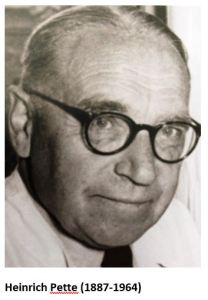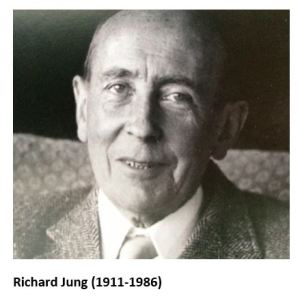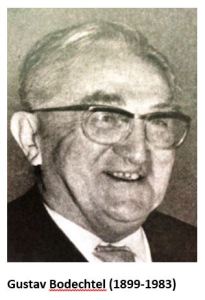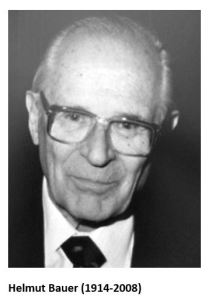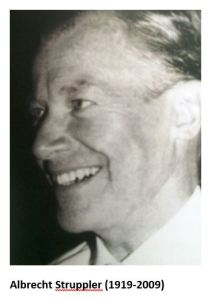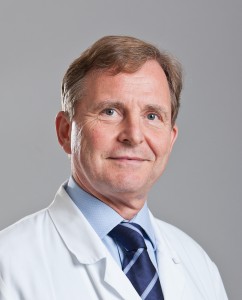 Neurology in Germany IV – Slow reorganisation after 1945
Neurology in Germany IV – Slow reorganisation after 1945
by Helmuth Steinmetz
After World War II, German neurology had to restart from almost point zero. Even though three “old” neurology chairs at the universities in Hamburg (Heinrich Pette), Heidelberg (Paul Vogel) and Würzburg (Georges Schaltenbrand) still existed or were reinstituted immediately, the process of emancipation of neurology as an independent field had been reversed between 1933 and 1945 (see previous chapters of this series). Today’s German Neurological Society, originally founded in 1907 and temporarily dissolved in 1935, was reestablished not before 1950. It took until 1951 and 1955 until the first “new” neurology chairs were created in Freiburg (Richard Jung) and Düsseldorf (Eberhard Bay). Not before 1968 – and only in West Germany – a board certification for either neurology or psychiatry (or both) became available. Only since the late 1970ies every university medical school in West Germany had a dedicated neurology chair. In East Germany, the University of Leipzig remained the only academic institution with an independent neurology department established in 1965 (Peter Feudell). [1]
Emancipation versus integration
During the 1950ies and 1960ies many German colleagues argued for maintaining the institutional and educational integration of neurology into psychiatry (“Nervenheilkunde”). Among their arguments were an expected lack of “enough” purely neurological patients and the importance of neurology as a scientific bridge between psychic and organic medicine. [1] Finally, this intensive dispute was not solved by arguments but mainly by neuroscientific progress that started to speed up in the 1970ies and simply required further specialisation in the emerging methods of clinical electrophysiology, neuroimaging, neuropharmacology, neurointensive care, etc. Growing numbers of neurological patients, increasing therapeutic options and the material prosperity during and after the German ”economic miracle” further contributed to a relatively late re-emancipation of neurology in (West) Germany.
Re-emerging “schools” after 1945
The gradual recovery of neurology in the early postwar period was driven by only a few local neurological “schools” and key figures. Heinrich Pette, chairman in Hamburg-Eppendorf since 1934, remained a particularly important teacher in the initial phase. He also was the first president of the German Neurological Society reinstituted in 1950. Among Pette’s successful scholars of the 1950ies were Gustav Bodechtel (later Munich), Rudolf Janzen (Dortmund, Hamburg), Werner Scheid (Cologne), Helmut Bauer (Göttingen) and Hans-Georg Mertens (Würzburg). These descendants of the “Hamburg school” later became the academic teachers of Adolf Schrader (Munich), Friedrich Erbslöh (Gießen), Albrecht Struppler (Munich), and Hanns Christian Hopf (Mainz), to mention only a few.* Already starting in the 1950ies, the spectrum of neurology was increasingly broadened by scientific and methodological inputs from experimental and clinical neurophysiology. Particularly influential pioneers of this development were Richard Jung (“Freiburg school”) and Albrecht Struppler (Munich), with many of their scholars still being active today.* [1] Richard Jung became the first president of today’s German Society of Clinical Neurophysiology and Functional Imaging originally founded in 1950 under the name “Deutsche EEG-Gesellschaft”. Just as Pette in the late 1950ies, Jung and Struppler also constituted dedicated neuroradiology sections within their neurology departments and strongly promoted functional neurological surgery. Neurovascular ultrasound was among the methods specifically elaborated in Freiburg, and Struppler performed functional stereotaxy himself until well after his retirement. It was this generation and the return to scientific mind-openness that began to pave the way for today’s internationalisation and Europeanisation of German neurology.
* Only deceased colleagues are mentioned in this chapter.
Literature
1. Kömpf D (Ed). 1907-2007. 100 Jahre Deutsche Gesellschaft für Neurologie. Deutsche Gesellschaft für Neurologie, Berlin, 2007.
Professor Helmuth Steinmetz works at the Center of Neurology and Neurosurgery, University Hospital/ Goethe University Frankfurt, Germany

